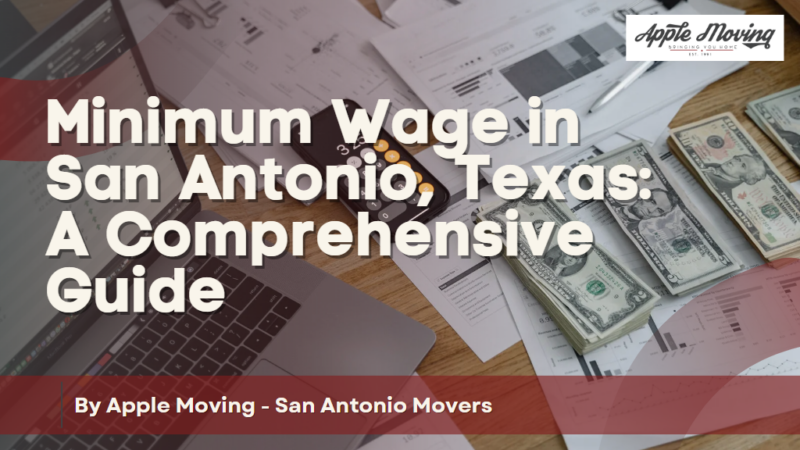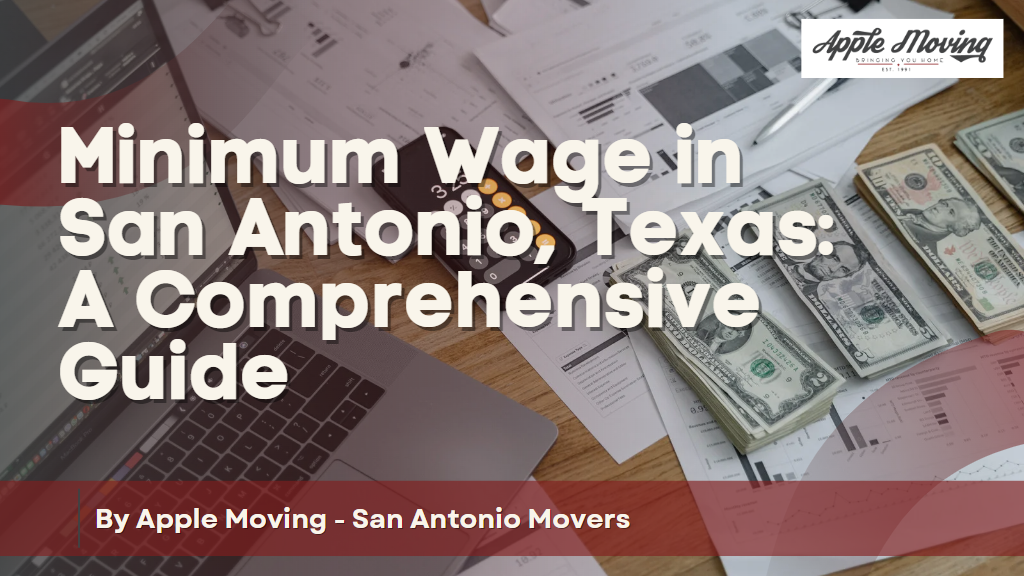Minimum Wage in San Antonio, Texas: A Comprehensive Guide
Minimum wage is a topic that impacts millions of Americans, including those residing in San Antonio, Texas. As the cost of living rises, a fair and livable wage becomes increasingly essential for workers to make ends meet. Like other cities across the United States, San Antonio has its own set of minimum wage laws and regulations that employers must abide by. Understanding these laws and how they affect workers is crucial for anyone seeking employment or currently employed in the city. This comprehensive guide will provide all the information you need about minimum wage in San Antonio.
Current Minimum Wage Rates in San Antonio
San Antonio, Texas’s current minimum wage is $7.25 per hour, the same as the federal minimum. Most municipal workers, including those who work in the public and private sectors and are employed full- or part-time, are subject to this rate. There are a few exceptions to this rule, though. A lower minimum wage, for instance, may be paid to workers who get tips as part of their employment (such as servers or bartenders), provided that their tips increase their total hourly salary to at least $7.25. Also, some industries might have higher standards than the federal minimum wage. The minimum wage in San Antonio, Texas, has stayed at $7.25 per hour since 2009 despite calls for a rise.
Exceptions to the Minimum Wage Rule in San Antonio
In San Antonio, Texas, the minimum wage is currently set at $7.25 per hour, the same as the federal minimum wage. However, there are exceptions to this rule, and certain workers are not entitled to receive the minimum wage. These exceptions include the following:
- Tipped Employees: Employers can pay tipped employees a lower minimum wage of $2.13 per hour, as long as they earn enough tips to increase their hourly wage to at least $7.25.
- Youth Workers: Employers can pay employees under 20 a lower minimum wage of $4.25 per hour for the first 90 consecutive calendar days.
- Disabled Workers: Employers can obtain a special certificate from the Department of Labor to pay workers with disabilities a lower wage based on their productivity levels.
- Independent Contractors: Workers classified as independent contractors are not entitled to the minimum wage or other benefits afforded to employees.
Both employers and employees must be aware of these exceptions to the minimum wage rule in San Antonio to ensure they comply with state and federal labor laws.
The Impact of Minimum Wage on Employment and The Economy in San Antonio
The minimum wage is the lowest compensation an employer legally requires to pay their workers. In San Antonio, Texas, the current minimum wage is $7.25 per hour, the same as the federal minimum. However, there are ongoing debates about the impact of minimum wage on employment and the economy in San Antonio. Here is a list of potential impacts to consider:
- Impact on Employment
When the minimum wage increases, businesses may cut jobs to cover the higher labor costs. This is because companies can only sometimes afford to pay the same amount to more workers so they may reduce their workforce instead. However, some research suggests raising the minimum wage may stimulate job growth by increasing consumer demand.
- Impact on Small Businesses
Small businesses may be hit the hardest by an increase in the minimum wage, as they may need more financial resources. This could lead to increased prices for goods and services and impacting where to eat in San Antonio, reducing consumer demand and, in turn, fewer jobs.
- Impact on the Economy
Increasing the minimum wage could help the economy by increasing consumer spending and stimulating economic growth. However, it could also increase business costs, leading to inflation.
- Impact on Poverty
Increasing the minimum wage could reduce poverty by giving workers more money to support themselves and their families. It could also reduce the need for government assistance programs, as workers may no longer need to rely on them.
- Impact on Income Inequality
Raising the minimum wage could help reduce income inequality by increasing wages for low-income workers. This could help narrow the wealth gap between the rich and poor, improving social and economic conditions in San Antonio.
Tips For Employers to Comply with Minimum Wage Laws in San Antonio
As an employer in San Antonio, Texas, it is crucial to comply with minimum wage laws to avoid costly penalties and legal issues. Here are some tips for employers to ensure compliance with minimum wage laws in San Antonio:
- Understand The Law
The first step to compliance is to understand the minimum wage laws in San Antonio. The current minimum wage in San Antonio is $7.25 per hour, the same as the federal minimum wage. However, as mentioned earlier, there are exceptions to this rule for certain workers.
- Keep Accurate Records
Employers should maintain accurate records of employee hours, wages, and deductions or allowances. This information should be kept for at least three years and be readily available for inspection by the Department of Labor.
- Pay Minimum Wage and Overtime
Employers must pay their employees at least the minimum wage for all hours worked. In addition, employees who work more than 40 hours in a week must be paid overtime at a rate of 1.5 times their regular hourly rate.
- Classify Employees Correctly
Employers should correctly classify their workers as either employees or independent contractors. Misclassification can result in penalties and legal issues.
- Avoid Retaliation
Employers should not retaliate against employees complaining about minimum wage violations or participating in investigations or proceedings related to minimum wage laws.
- Seek Legal Advice
Employers should seek legal advice if they have questions about minimum wage laws or are facing legal action related to minimum wage violations.
By following these tips, employers can comply with minimum wage laws in San Antonio and avoid costly penalties and legal issues.
What Happens If an Employer Violates Minimum Wage Law in San Antonio?
If an employer in San Antonio violates minimum wage laws, they may face penalties and legal action. Penalties may include back pay for employees, fines, and legal fees. Repeated violations may result in higher penalties and legal action. Employers must comply with minimum wage laws to avoid these consequences.



